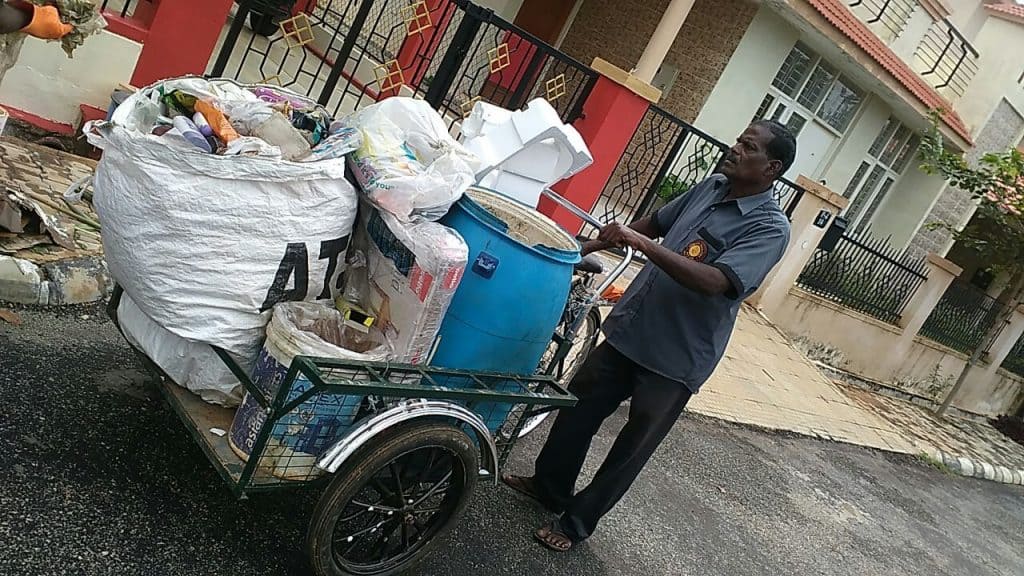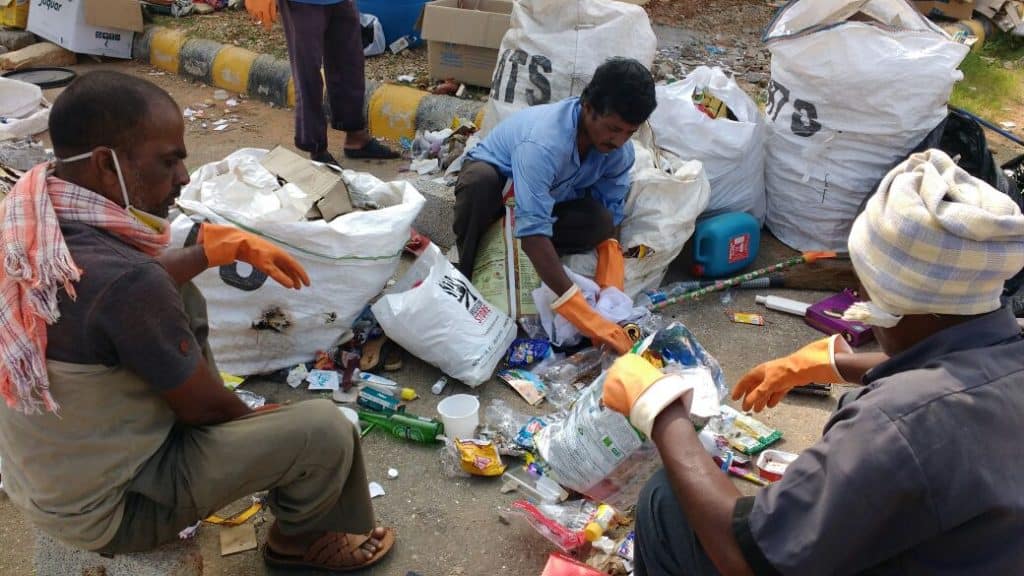“We dug the land and let them throw,
Soon we had dogs, rats and flies you know?
Behind the rising smoke you could see thunderous clouds
The rains came and came well and all got washed out,
Here and there lay lumps on the road
Sanitary napkins, diapers and plastics giving shelter to the microbes
Collection vehicle, when will you come back to pick the loads?
Enough is enough looks like there is no depending on you.
We got to figure out what to do.”
This was the situation in Vasanth Vihar, a gated community having 424 dwelling units including 112 apartments near the airport in Bengaluru.
We had been trying, albeit unsuccessfully, to implement waste segregation. The 2-bin one-bag was pushed to the residents. Most residents obliged with the rule, but saw no value in it as the Panchayath pourakarmikas ended up mixing all the segregated waste in their vehicle.
We had been on the lookout for an agent or an agency to put waste management in place. We had some ill-designed common compost pits in place and budget constraints prevent any upgradation. We also promoted home composting of biodegradable waste but it was a big challenge and change of lifestyle too immediate for most.
One day the Panchayath suddenly stopped collecting the waste as they had no assigned area to “dump” garbage. On our insistence they would take the waste but the waste would find its way into a quarry or burnt. Then the cycle would repeat. Eventually even that stopped.
There was a garbage agitation everywhere and BBMP stopped picking waste in the city. The residents near their new dumpsite in Mittiganahalli held a Rasta roko for almost a week to ensure BBMP vehicles didn’t pass through. Bagaluru quarry was locked down.
We were in a severe garbage crisis.
We chanced upon Prowaste, a waste management consultancy, they suited our needs and sensibilities and budget. The team worked with us systematically and with our constraints and resources.

Some of the things we learnt to do with the waste managers were:
- Waste audit. We found that we had, wet (kitchen waste /organic waste/ cooked and uncooked/ spoilt), dry recyclables (used plastics and papers), negative value waste (batteries and cheap plastics) etc and sanitary waste (used sanitary napkins, diapers and anything that had body fluids or parts), pet poop, pet hair and garden waste
- Segregation at source is made mandatory. We, however, eased into a 3 way segregation and did away with the 6 way segregation suggested by 2bin1bag website. Simpler method found more effect. Printed literature was given to individuals and community posters put up explaining origin to disposal of all forms of garbage.
- Dry waste days were designated to Tuesday and Friday, garden waste was cleared when needed, and Wet and Sanitary waste was to be collected every day. Pet excreta was meant to be composted separately.
- Vendors were brought in who would collect our segregated waste, the RWA directly signed contracts with them and we opted to tackle wet waste in house and modified the pits to a more usable design and the apartments invested in grill aerobic composters.
- Dry waste was segregated further by the housekeeping as this fetches better value and sanitary waste vendor was brought in. We needed two weatherproof segregated dry waste storage centers and the same was built in the suitable available location.
- The team from waste managers visited every Tuesday and Friday and supervised the housekeeping and engaged with the residents to ensure waste was segregated well. RWA incentivised the housekeepers by rewards from proceeds of the dry waste sale.
- Although the waste consultant was engaged for 4 months, resident participation ensured things fell into place by 3rd month.
- In all this there was constant communication going from the team in charge to the residents via all forms of available electronic media. The residents even planned a play around this at a celebration in our community centre.

Challenges and observations and what could have been done better:
- Finding a waste consultant who does not sell any products except their professional advice and is willing to work with your unique needs was a great stepping stone.
- Although 60 percent of the people were happy converts, the 40 percent needed great convincing. Most of them were “Young Indians”. It’s better to be inclusive than confrontational, always works better.
- It takes time to effectively roll out waste segregation, people expected overnight results. After six months we have a clean environment and good compost to boost our greenery and that is great motivation
- For those planning on implementing it in your societies – have a heart of steel, you will be yelled at, looked down at be called the “waste lady” (imagine Bangalore 80’s expression). But persist and persevere – very soon the courts will be cracking down on this.
- The RWA decided to not continue engagement with sanitary waste vendor. This costs money and is a requirement as per the solid waste management guidelines for a community. We hope to implement it one day.
- Perhaps the sanitary/ medical waste management companies can take a relook at their pricing.
- The local governing body can pitch in.
- There has to be a national push towards re-usables or traditional healthy and hygienic methods which can be promoted.
- It is mandatory to hold records of sale of dry recyclable waste and reject sanitary waste in case the authorities drop into to inspect.
- Engagement with the community about waste management needs to be a continuous process for a successful lifestyle shift.